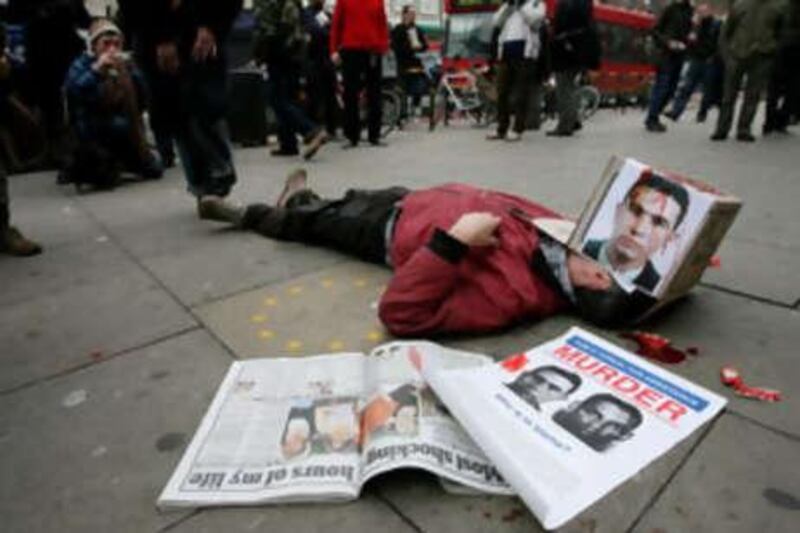LONDON // A verdict due tomorrow at an inquest into the death of an innocent Brazilian shot dead by police, who thought he was a Muslim suicide bomber, is set to bring to the boil a simmering controversy in Britain. The Metropolitan Police have already been found guilty of breaking health and safety laws over the shooting of Jean Charles de Menezes, a 27-year-old electrician, on a London underground train in July 2005. But at the end of last week, members of his family walked out of the inquest in disgust during the coroner's summing up when, at the end of seven weeks of evidence, he told the jury that it could not return a verdict of unlawful killing. Three of Menezes's cousins protested inside and outside the court wearing T-shirts displaying the message: "Your legal right to decide - unlawful killing verdict." The family's legal team, led by Michael Mansfield QC, also withdrew in protest. Sir Michael Wright, the coroner, has since told the 11 jurors that they must not be swayed by the demonstration and instructed them that they must only return an open verdict or one of lawful killing. A verdict of unlawful killing could not be supported, he said. "I'm not saying that nothing went wrong in a police operation which resulted in the killing of an innocent man. All interested persons agree that a verdict of unlawful killing could only be left to you if you could be sure that a specific officer had committed a very serious crime - murder or manslaughter," he said. The shooting of Menezes, after he was mistaken for one of the would-be suicide bombers who had attempted but failed to explode devices on London's transport system the day before, alarmed Muslim groups throughout Britain. In a statement, the Muslim Council of Britain expressed concern over the apparent existence of a shoot-to-kill policy and demanded that Scotland Yard make clear its reasons for shooting dead an innocent man. Police officers have said that, after mistakenly identifying Menezes as bomber Hussain Osman, they thought he was going to explode a device after he boarded a train at Stockwell station. However, the officers' accounts have been contradicted in certain crucial respects by other passengers on the train. One of the two policemen who opened fire on Menezes claimed he had shouted "armed police", before firing, but other witnesses challenged this, saying no warning was given. In the event, two officers opened fire with handguns on Menezes. He was hit seven times in the head at close range and received an eighth round in the shoulder. One of the police shooters claimed that, after he shouted his warning, Menezes's actions - he was said by officers to have stood up - had made him fear the electrician was carrying a bomb. But passengers testified that the Brazilian had not shown any significant reaction to the police's arrival. However, the coroner told jury members that, even if they believed that the police had lied, they could not blame them for the death. "Many people tell lies for a variety of reasons [including] to mitigate the impact of what might be a tragic mistake," he said. At the time of the shooting, few doubt that the police in London were under pressure. Apart from the failed bombings the day before, two weeks earlier four young, Islamic extremists had detonated bombs on London's bus and underground systems, killing themselves and more than 50 others. Police keeping watch on a block of flats with links to Hussain Osman - and where Menezes was living - were given only imprecise descriptions and photographs of Osman. Communications with the control room and between officers were poor and were non-existent once officers had entered the underground station. During the inquest, police wrongly claimed they had been unable to access photographs of Osman that could have ruled out Menezes as a bomb suspect. A detective had said they were unable to contact the government's driver licensing agency to get a picture. Later, he had to apologise to the inquest, saying the photograph had been received. There has also been evidence that police on the ground received "ambiguous" orders from their commanders on how to apprehend the man they thought was a bomber. One of the officers said Menezes could have been stopped long before he reached the tube station. The police, Mr de Menezes's family and the Muslim community throughout Britain will be watching closely tomorrow. dsapsted@thenational.ae
Verdict due on police shooting
A verdict due tomorrow at an inquest into the death of an innocent Brazilian shot dead by police is set to bring to the boil a simmering controversy in Britain.

Editor's picks
More from the national





